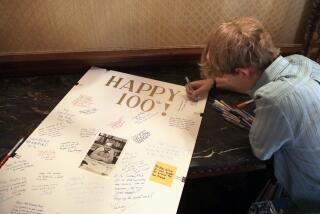Julian Schwinger; Nobel Physicist, Professor at Harvard and UCLA
- Share via
Julian Schwinger, a Wunderkind of physics who earned his doctorate at 21, was a full professor at Harvard at 29 and won the Nobel Prize when he was 47, died Saturday.
A spokesman for the UCLA physics department said Monday that Schwinger--who came to the university full time in 1972--was 76 when he died of pancreatic cancer at his Bel-Air home.
Schwinger, who was then teaching at Harvard, shared the 1965 Nobel with Richard Feynman of Caltech and Shinichero Tomonaga of Japan for work on the theory of quantum electrodynamics. The exceedingly complex theory deals with the fields and interactions of elementary particles.
Mildly eccentric, Schwinger in his early years was known for preferring to sleep during the day and work at night.
At a 60th-birthday tribute to him in 1978, a colleague recalled that when everyone else working at the Massachusetts Institute of Technology’s radiation laboratory during World War II was leaving at 5 p.m., “Julian was just arriving.”
Schwinger was working on radar projects at MIT and later joined the Manhattan Project, which developed the first atom bomb.
His awards were numerous.
In 1964, President Lyndon B. Johnson presented him the newly created National Medal of Science. In 1951 he was one of two young scientists selected for the first Albert Einstein award, established by the Institute for Advanced Study at Princeton, where Einstein was in residence. And the National Academy of Sciences, to which he belonged for 45 years, awarded him its Nature of Light prize in 1949.
Schwinger, the son of a dress manufacturer, was a child prodigy who skipped three grades of public school and entered City College of New York at 14. He transferred to Columbia University and received a bachelor of arts degree when he was 17, then studied at the University of Wisconsin and Purdue University before earning his doctorate at Columbia.
He moved to Berkeley, where he worked with J. Robert Oppenheimer before returning to teach at Harvard. When he became a full professor there, he was one of the youngest to have achieved that rank in the 300-year history of the campus.
Beyond his contributions as a scientist, Schwinger was considered one of UCLA’s best and most beloved teachers.
“He directed more than 70 doctoral theses and is the ancestor of at least four generations of physicists,” said David Saxon, UCLA professor emeritus of physics and president emeritus of the University of California.
Three of those students went on to win their own Nobel Prizes.
“Julian was a gentle, cultivated man and one of a handful of scientists whose magnificent contributions made science the great intellectual adventure of the 20th Century,” Saxon added.
UCLA Chancellor Charles E. Young said Schwinger “will be remembered as one of the great intellectual leaders of UCLA.”
Schwinger’s friends said he loved music as well as physics. He was an ardent pianist who studied for most of his life.
“If something is worth doing, it is worth doing badly,” he once said of his playing.
He is survived by his wife, Clarice.






